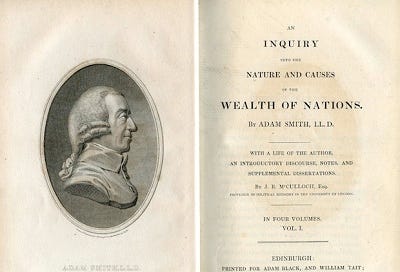Productivity, Utility, and the Knowledge Economy
Reminding myself not to fall victim to the physical fallacy.
In yesterday’s post, I did my best to explain why Ameshia and Batya from The Hill were wrong to denigrate the content creators on TikTok. I explained that TikTokers, like other digital creatives, produce value for consumers that is no less real than manufacturers of physical commodities. In short, the two had succumbed to what Thomas Sowell calls the “physical fallacy.”
I find Sowell’s argument to be philosophically persuasive. Moreover, the economic reality of the matter is that knowledge workers, i.e., people who do not create physical things, per se, are highly compensated for the services they render. If they were not generating real value, they would not really be able to command the earnings they do. Simple enough, right? Yes, but providing some examples reifies the argument. Knowledge workers include authors, musicians, professors, consultants, doctors, and lawyers. Quite a list of reputable professions! While none of these occupations perform work that generates capital, they are nonetheless useful. They create value for the consumer, which, as Adam Smith reminds us, is “the sole purpose of production” and, consequently, physical capital.
Smith pithily elucidates the distinction between productive and useful labor:
There is one sort of labor which adds to the value of the subject upon which it is betowed: There is another which has no such effect. The former, as it produces a value, may be called productive; the latter, unproductive labor.1
The legendary economist and moral philosopher identifies “the labour of some of the most respectable orders in the society” as being “unproductive of any value”, i.e., “not fix[ing] or realiz[ing] itself in any permanent subject, or vendible commodity, which endures after that labour is past.” Nonetheless, such valuable is often incredible useful, important, and performed by some of the “gravest and most important” professions, e.g., “churchmen, lawyers, physicians, men of letters of all kinds.” I take this last point to heart, as I would qualify as a man of letters, to at least a marginal degree.
I encourage my readers who are fellow knowledge workers to take Sowell and Smith’s points to heart if they ever find themselves doubting the useful of the services they render in comparison to their more productive, capital-producing peers.
Adam Smith, The Wealth of Nations, II.iii.1.




